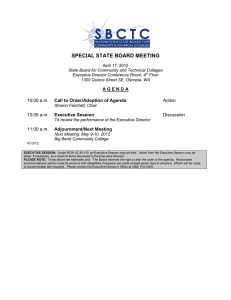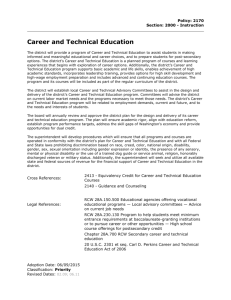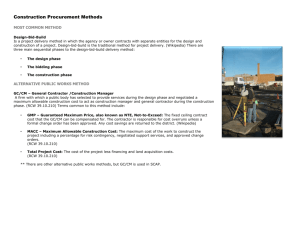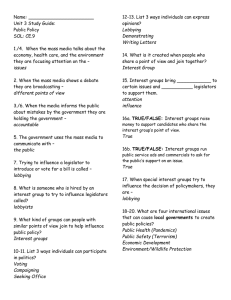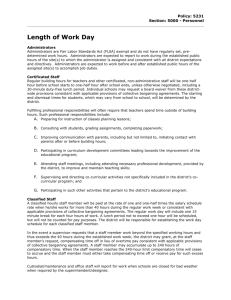February 8, 2010
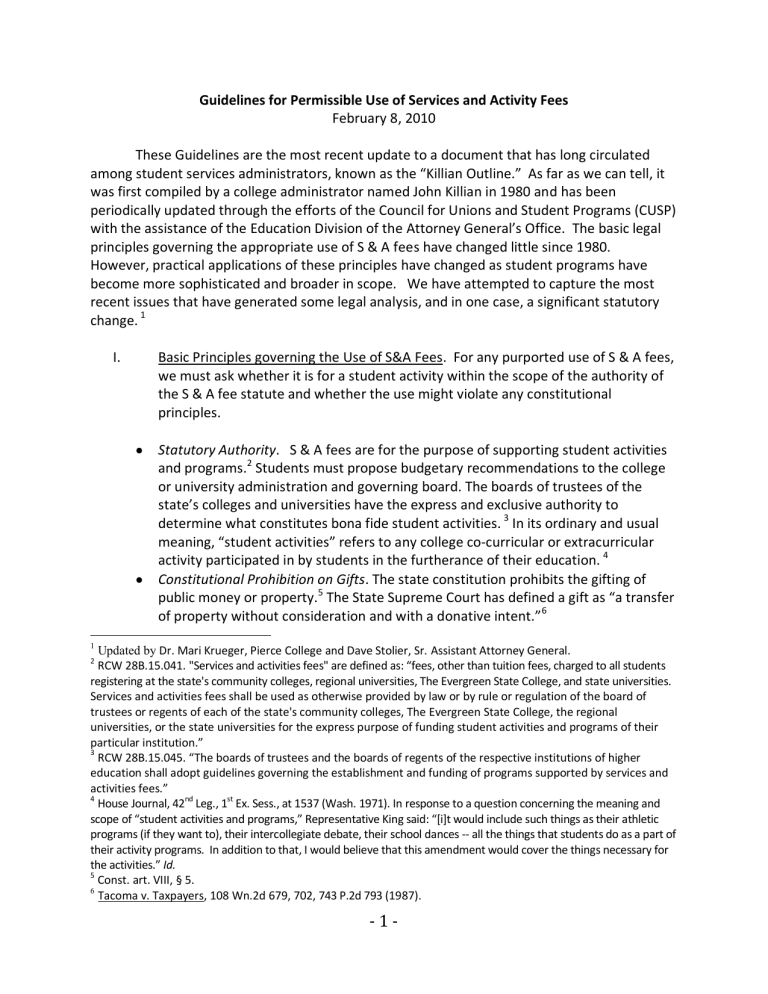
Guidelines for Permissible Use of Services and Activity Fees
February 8, 2010
These Guidelines are the most recent update to a document that has long circulated among student services administrators, known as the “Killian Outline.” As far as we can tell, it was first compiled by a college administrator named John Killian in 1980 and has been periodically updated through the efforts of the Council for Unions and Student Programs (CUSP) with the assistance of the Education Division of the Attorney General’s Office. The basic legal principles governing the appropriate use of S & A fees have changed little since 1980.
However, practical applications of these principles have changed as student programs have become more sophisticated and broader in scope. We have attempted to capture the most recent issues that have generated some legal analysis, and in one case, a significant statutory change.
1
I.
Basic Principles governing the Use of S&A Fees. For any purported use of S & A fees, we must ask whether it is for a student activity within the scope of the authority of the S & A fee statute and whether the use might violate any constitutional principles.
Statutory Authority . S & A fees are for the purpose of supporting student activities and programs.
2 Students must propose budgetary recommendations to the college or university administration and governing board. The boards of trustees of the state’s colleges and universities have the express and exclusive authority to determine what constitutes bona fide student activities.
3
In its ordinary and usual meaning, “student activities” refers to any college co-curricular or extracurricular activity participated in by students in the furtherance of their education.
4
Constitutional Prohibition on Gifts . The state constitution prohibits the gifting of public money or property.
5
The State Supreme Court has defined a gift as “a transfer of property without consideration and with a donative intent.”
6
1
Updated by Dr. Mari Krueger, Pierce College and Dave Stolier, Sr. Assistant Attorney General.
2
RCW 28B.15.041. "Services and activities fees" are defined as: “fees, other than tuition fees, charged to all students registering at the state's community colleges, regional universities, The Evergreen State College, and state universities.
Services and activities fees shall be used as otherwise provided by law or by rule or regulation of the board of trustees or regents of each of the state's community colleges, The Evergreen State College, the regional universities, or the state universities for the express purpose of funding student activities and programs of their
3 particular institution.”
RCW 28B.15.045. “The boards of trustees and the boards of regents of the respective institutions of higher education shall adopt guidelines governing the establishment and funding of programs supported by services and
4 activities fees.”
House Journal, 42 nd
Leg., 1 st
Ex. Sess., at 1537 (Wash. 1971). In response to a question concerning the meaning and scope of “student activities and programs,” Representative King said: “*i+t would include such things as their athletic programs (if they want to), their intercollegiate debate, their school dances -- all the things that students do as a part of their activity programs. In addition to that, I would believe that this amendment would cover the things necessary for
5 the activities.” Id.
Const. art. VIII, § 5.
6
Tacoma v. Taxpayers, 108 Wn.2d 679, 702, 743 P.2d 793 (1987).
- 1 -
Student authority : Students have no statutory control over S&A fees; that authority resides with the board of trustees. Pursuant to statute, students propose expenditures through the S&A budget process, serve as the majority of the S&A budget committee, and make recommendations to the board of trustees. Students are expected to have a “strong voice” in recommending budgets for S&A fees.
7
II.
Examples of Im permissible Uses of S&A Fees.
The following are examples of S&A fee expenditures that have been judged impermissible because they involve “gifting” or because they are not “student activities”:
Free meals and/or lodging for anyone without consideration and with a donative intent.
Gifts of appreciation or concern for anyone (farewell gifts, flowers for bereavement, etc.) unless in return for participation or as an award for which one has competed and won.
Food or refreshments purchased by a student group without the board’s approval.
8
Tips or gratuities for services rendered by anyone unless authorized by OFM.
Meals, lodging, coffee hours, receptions, or teas for a guest entertainer, lecturer, etc., unless required by the contract made for their services.
Salaries of professional employees in teaching, administrative or clerical positions not directly related to the student programs’ operations.
Complimentary tickets or admissions as a gift or for public relations purposes.
9
Career Day – An event at which high school students (typically juniors or seniors) are invited to spend a day on campus with their high school counselors to learn about the educational offerings of the college as those offering relate to various careers, and which involves service of refreshments to the high school students and their counselors.
10
Orientation for prospective students under the same theory as above.
Programs, personnel, facilities, equipment and maintenance that are considered basic services provided by the college or supported by existing contracts.
7
RCW 28B.15.045.
8
AS officers and employees of the college in “travel status” or engaged in an official “working” meeting or activity approved by the board constitute an exception to this rule. Thus, funds may be used for “working” official student officer sessions or retreats which are an approved student activity. However, the cost of meals cannot be paid for employees (nonstudents) for such a meeting unless the employee is in travel status as defined by the OFM
9 regulations.
The exception to this rule is that free admission may be granted to a news media person who is attending the function in his news reporting capacity, or to persons performing their assigned duties, since the granting of admission in these instances is in return for participation (and therefore supported by consideration).
10
Because this event actually involves non-students, it is not properly a student activity and therefore should not be funded by S and A fees. The institution most certainly has the authority to provide the orientation, but refreshments such as food and drink may not be funded from public funds. It likely constitutes impermissible promotional hosting.
See State ex rel. O’Connell v. Port of Seattle , 65 Wn2d 801 (1965).
- 2 -
III.
Examples of Permissible Uses of S&A Fees.
The following have been determined to be appropriate uses of S&A fees, provided that they are approved as bona fide student activities by the board of trustees and meet any other requirements noted:
Traditional and time-honored activities such as student government, clubs, student governmental or programming organizations’ activities or events, health and wellness programs, retreats, conferences, musical, dramatic, artistic, debate, and forensic presentations of an extra-curricular nature, student publications and other mass media initiatives,
S&A fees may be used for the expenses associated with these activities, including meals and lodging during group travel. These costs may be paid as a return for participation.
Trophies, certificates or engraved plaques, sweaters, warm-up jackets, chenille letters, rain clothes, monogrammed dress jackets or attire, etc. Such items may be provided to students who have served or are serving as members of athletic teams, student leadership teams, cheer leaders, outstanding scholars, outstanding participants in drama, debate, student government, and others who have earned them, provided that they are a result of participation, are personal in nature, and are of nominal value.
Support for college employees in student programs operations.
11
S&A fees may be used only to the extent that the employees are engaged in student activities and programs--as opposed to normal maintenance and operation functions of the college.
Premiums for liability and casualty insurance coverage for the college for actions taken by students serving in official capacities or participating in such activities and programs.
Meals for reception or award ceremony attendees who are part of the program.
Meals and refreshments (coffee, cookies, etc.) at approved student programs as incidental thereof. Examples include: graduation ceremonies, vocational certificate awards programs, scholarship convocations or receptions, student activity or club meetings
12
, student awards, student work sessions, new student orientations, honor society initiations, scholarship donors receptions, etc.
Costs associated with child care centers for the children of students.
Dues for institutional memberships in officially recognized student leadership, governmental or programming organizations.
Special tutorial or co-curriculum programs provided it is not to sustain a critical operation of the college
11
Note: Stipends and other supplemental payments to college or university employees are not appropriate where there is already a contractual agreement.
12
Food and beverages may be provided at an “open house” hosted by a student club aimed at promoting awareness of that club’s activities on campus, provided that the club provides the college students who attend that open house with written or oral information about the club's function and mission.
- 3 -
A legal aid program which provides services to individual students
13
, provided that the program is not used to institute legal action against the college or university.
Furniture and equipment for informal or non-instructional student spaces as approved by the associated student association or student governmental organization.
Partial subsidization of a student food bank operation, provided that that the food bank benefits only students.
Scholarships. RCW 28B.10.825 expressly provides for a limited amount of S&A fees to be used for an institutional student loan fund for needy students. RCW
28B.10.703 and 704 specify particular non-S&A sources for scholarships for athletic and curriculum-related activities. Thus, there must be some alternative source of statutory authority for any additional use of S&A fees for scholarships. We believe that there may be certain circumstances where a scholarship could be funded with
S&A monies. Sufficient statutory authority may reside in the broad-based delegation to the board to allocate S&A money for appropriate student activities, provided that the program is properly brought forward through the S&A student committee and board of trustees processes. Second, in order to satisfy the requirement that S&A fees go to students rather than prospective students, a recipient would have to be enrolled in the institution before he or she receives any money. Third, the surest way to avoid gift of public funds problems would be to ensure that either the scholarship is based in whole or in part on need or the award is supported by some sort of consideration, such as employment, participation or contribution to an athletic or extracurricular performance program.
IV.
Use of S&A fees on student political clubs and activities.
Recognition and Allocation. S&A fees may be used to fund officially recognized student political clubs or organizations.
14
Allocation of funds to student political groups must be neutral with respect to the viewpoint of the groups.
15
Use of Funds. S&A fees may be used to support political speakers, travel expenses and other relevant club activities as deemed reasonable by the institution.
Lobbying.
16
Use of S&A fees for lobbying by student government is now expressly authorized by statute. This is a significant change in the law. In the 2009 legislative
13 Note: The associated student body must use the services of the Attorney General's Office.
14
See Board of Regents of the University of Wisconsin System v. Southworth, 528 U.S. 217, 233, 120 S.Ct. 1356
(2000) (“The University may determine that its mission is well served if students have the means to engage in dynamic discussions of philosophical, religious, scientific, social, and political subjects in their extracurricular campus life outside the lecture hall. If the University reaches this conclusion, it is entitled to impose a mandatory fee to sustain an open dialogue to these ends.”).
15
RCW 28B.15.044; Good v. Associated Students of the University of Washington, 86 Wn.2d 94, 542 P.2d 762 (1975);
Board of Regents of the University of Wisconsin System v. Southworth, 528 U.S. 217, 229-230, 120 S.Ct. 1356
(2000).
- 4 -
session, RCW 28B.15.610, pertaining to voluntary student fees, was amended to provide in pertinent part, “. . . Notwithstanding RCW 42.17.190
(2) and (3), voluntary student fees imposed under this section and services and activities fees may be used for lobbying by a student government association or its equivalent and may also be used to support a statewide or national student organization or its equivalent that may engage in lobbying.” (emphasis added).
Use of S&A fees for lobbying activities by students other than by or through the student government association, is still governed by the constraints on public agencies and reporting requirements in RCW 42.17.190.
17
Campaign contributions. Under no circumstances may public funds be used as a gift or campaign contribution to any elected official or officer or employee of a public agency.
18
Nor may any public employee authorize the use of any facilities of a public agency
(employees, stationary, postage, machines, etc.) to be used for the purpose of assisting a campaign for election or for the promotion or opposition to any ballot proposition.
RCW 42.17.130; RCW 42.52.180 (state Ethics Act).
V.
Fundraised projects
In the case of fundraising projects that have used S&A funds as “seed money”, all revenues are then commingled with state funds and are under college and state spending restrictions of public funds.
Funds raised without the use of state property or money are private funds and may be used without restriction. Any such funds raised, in order to retain their private character, must not be commingled with other public funds.
Privately raised funds may retain their private character even if state facilities are used where (a) fair market value is paid for rental of state facilities; or (b) fundraising activities occur in public areas consistent with the institution’s facilities use policy for all users.
In the case of fundraising projects that have not used S&A funds as “seed money”, all revenues should be held in a separate college “trust” account.
16
“ Lobbying ” means to attempt to influence the passage or defeat of any state legislation. “ Legislation ” means matters pending or proposed in either house or matters that may be the subject of action. “ Attempt to influence ” includes legislative staff as well as legislators.
17
Orchestrated grassroots lobbying or other indirect forms of lobbying, i.e., mailing campaigns; mobilizing nonstate employees to action; rallying public support; organizing rallies in Olympia; and creating citizen action groups, are not permitted with public funds.
18
For example, S&A funds may not be used for flyers or advertisements endorsing a political candidate, such as
“Vote for so-and-so for U.S. Senate.” Similarly, S&A funds may not be used for yard signs endorsing a political candidate. However, S&A funds may be used for a student newspaper even if it includes endorsements and express opinions on political candidates via editorials. This is permissible due to the historical and traditional role of newspapers.
- 5 -
